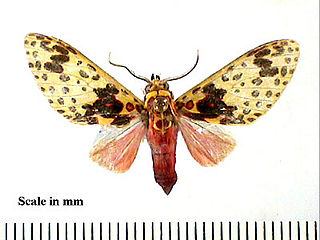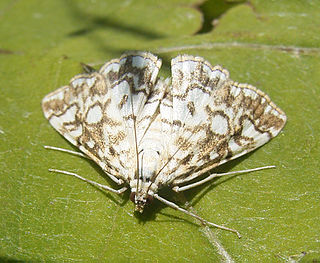Sir George Francis Hampson, 10th Baronet was an English entomologist.

Amata is a genus of tiger moths in the family Erebidae. The genus was erected by Johan Christian Fabricius in 1807.

Amaxia is a genus of moths in the family Erebidae erected by Francis Walker in 1855. The type species of the genus is Amaxia pardalisWalker, 1855.

Metarctia is a genus of moths in the family Erebidae and subfamily Arctiinae. The genus was erected by Francis Walker in 1855.

Spilosoma is a genus of moths in the family Erebidae originally described by John Curtis in 1825. A very heterogeneous group, it is in need of review by the scientific community, as certain species probably need reclassification into their own genera.

Anania is a genus of moths of the family Crambidae described by Jacob Hübner in 1823.

Glyphodes is a genus of moths of the family Crambidae described by Achille Guenée in 1854.

Herpetogramma is a genus of moths of the family Crambidae described by Julius Lederer in 1863. It currently comprises 106 species and is found in North America, Eurasia, Australia, New Zealand, Central and South America. Of the few species where host plants are known, the larvae mostly feed on grasses.

Metasia is a genus of moths of the family Crambidae.

Nacoleia is a genus of moths of the family Crambidae described by Francis Walker in 1859.

Pyrausta is a speciose genus of moths of the family Crambidae. The genus was erected by Franz von Paula Schrank in 1802.

Pilocrocis is a genus of moths of the family Crambidae. The genus was first erected by Julius Lederer in 1863.

Syllepte is a genus of moths of the family Crambidae.

Hypsopygia is a genus of moths belonging to the family Pyralidae. Though fairly small, they are large among their relatives. It was described by Jacob Hübner in 1825.

Tirathaba is a genus of moths of the family Pyralidae described by Francis Walker in 1864.
Emmalocera is a genus of snout moths. It was described by Émile Louis Ragonot in 1888.
Amaxia apyga is a moth of the family Erebidae. It was described by George Hampson in 1901. It is found in Costa Rica.
Amaxia pardalis is a moth of the family Erebidae. It was described by Francis Walker in 1855 and is the type species of the genus Amaxia. It is found in Brazil, Suriname, Costa Rica and Mexico.

Amaxia flavipuncta is a moth of the family Erebidae found in Brazil. It was described by George Hampson in 1903.

Acentropinae is a fairly small subfamily of the lepidopteran family Crambidae, the crambid snout moths. Species of this subfamily are exclusively found in wetlands and aquatic habitats.















